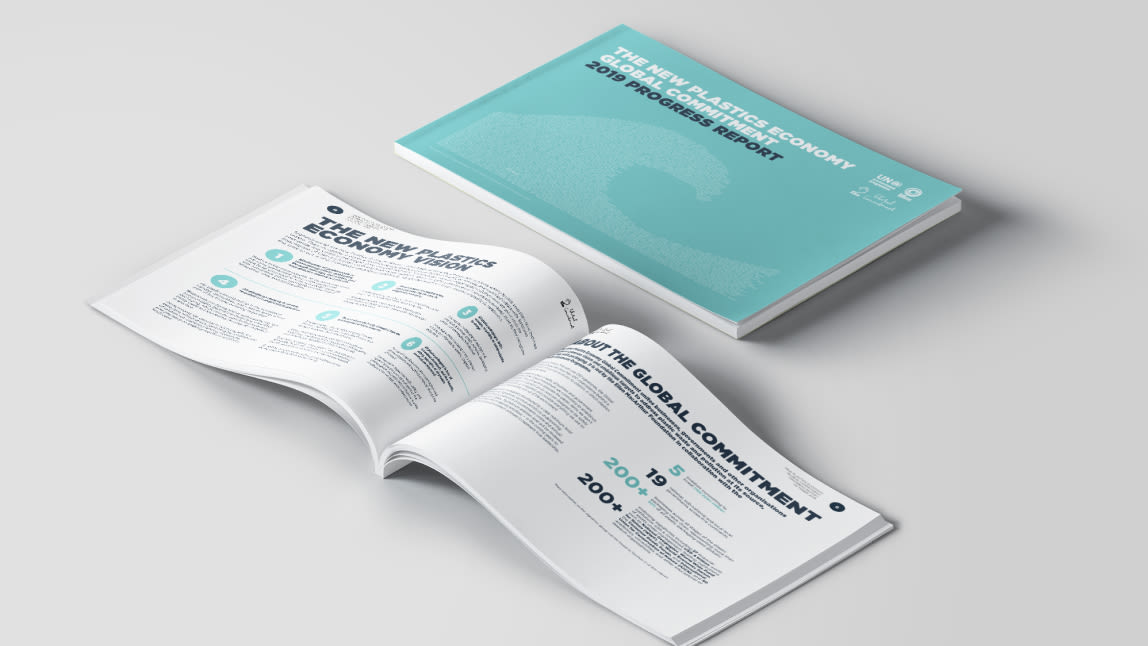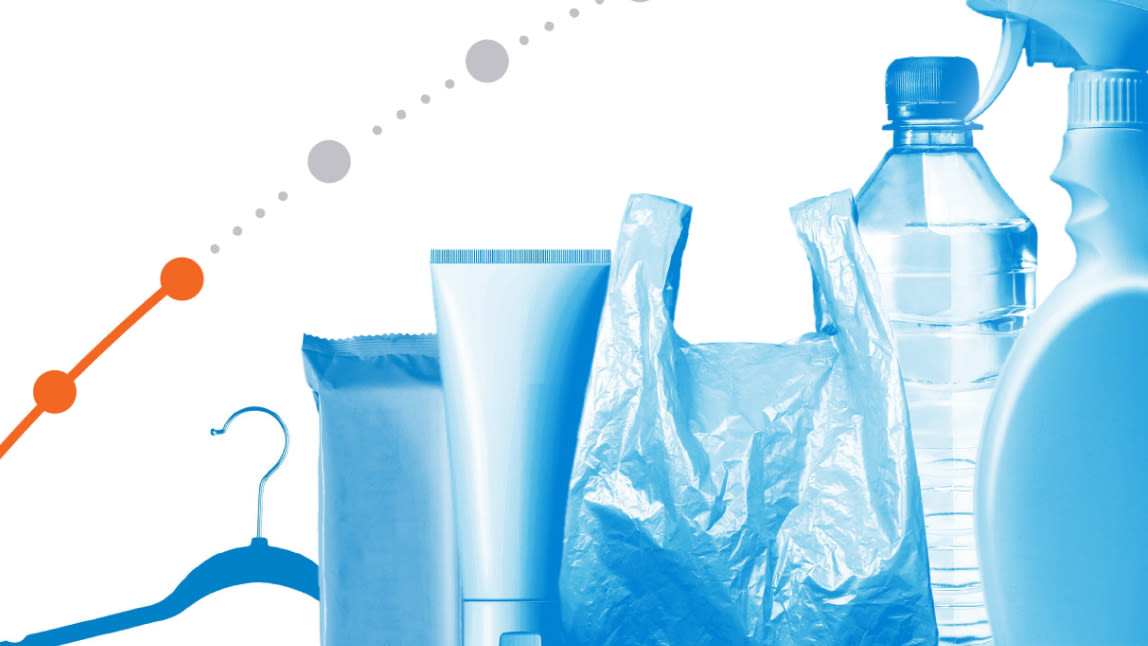First New Plastics Economy Global Commitment report reveals targets and initial steps by Global Commitment signatories to eliminate plastics waste and pollution
Major companies including Carrefour, Colgate Palmolive, Danone, MARS, Nestlé, SC Johnson, The Coca Cola Company, and Unilever publish data on their annual plastic packaging volumes, most of them for the first time
Consumer goods companies and retailers commit to increase recycled content in their packaging to an average of 25% by 2025, compared with the current global average of just 2%
Leading businesses and governments will end the use of problematic and unnecessary plastic including PVC and single-use plastic straws and carrier bags, many of them by the end of this year. 40 brands and retailers are piloting or expanding reuse and refill schemes�
The Ellen MacArthur Foundation welcomes these initial efforts, but calls for more action to eliminate problematic and unnecessary plastic packaging, and a greater shift to reuse delivery models that reduce the need for single-use packaging
Number of Global Commitment signatories rises from 250 to more than 350. New signatories include Apple, Barilla, Tetrapak, L’OCCITANE en provence, Government of Rwanda, and the cities of São Paulo (Brazil), and Ljubljana (Slovenia). Financial institutions with over USD 4 trillion in assets under management have endorsed the commitment.
THURSDAY, MARCH 14 Details of how brands, governments, and other organisations are tackling plastic pollution have been set out side-by-side for the first time, thanks to a new report published by the Ellen MacArthur Foundation’s New Plastics Economy initiative, in collaboration with UN Environment. The report follows the launch of the New Plastics Economy Global Commitment, which established a vision to stop plastic waste and pollution at source by applying circular economycircular economyA systems solution framework that tackles global challenges like climate change, biodiversity loss, waste, and pollution. It is based on three principles, driven by design: eliminate waste and pollution, circulate products and materials (at their highest value), and regenerate nature. principles.
More than 250 organisations, representing every part of the plastics system, signed the commitment when it was launched in collaboration with UN Environment in October 2018. Since then the number of signatories has risen to more than 350 and now includes Barilla, Tetrapak, and L’OCCITANE en provence, as well as the Government of Rwanda and the cities of São Paulo (Brazil) and Ljubljana (Slovenia). Financial institutions with over USD 4 trillion in assets under management have endorsed the commitment.
The Global Commitment aims to create ‘a new normal’ for plastic packaging, with signatories committing to:
Eliminate problematic or unnecessary plastic packaging and move from single-use to reusereuseThe repeated use of a product or component for its intended purpose without significant modification. packaging models
Innovate to ensure 100% of plastic packaging can be easily and safely reused, recycled, or composted by 2025
Circulate the plastic produced, by significantly increasing the volumes of plastic reused or recycled into new packaging
By providing previously unpublished data and setting out commitments side by side, this report offers a new level of transparency about today’s plastic system and efforts to stop plastic waste and pollution.
The decision by more than 30 companies to publicly disclose their annual plastic packaging volumes in the report is an important step towards greater transparency. We encourage all companies that make and use plastics to disclose their plastics footprint.
The report shows welcome progress in increasing the amount of recycled content in plastic packaging, and the phasing out of non-recyclable materials. The recycled content targets for plastic in packaging jointly represent 5 million tonnes by 2025. This is the biggest ever commitment to use recycled plastics in packaging and provides clear demand for increased investment in high-quality recycling and will result in a significant reduction in virgin plastics production.
However, while improving recycling is crucial, we cannot recyclerecycleTransform a product or component into its basic materials or substances and reprocessing them into new materials. our way out of the plastics issues we currently face. Elimination of problematic or unnecessary plastic packaging through redesign, innovation, and new delivery models is a priority. Reuse models need to be applied where relevant, reducing the need for single-use packaging. All of this is an explicit part of the Global Commitment vision, endorsed by all 350+ signatories.
New Plastics Economy lead Sander Defruyt said: “The targets and action plans set out in this report are a significant step forward compared with the pace of change of past decades. However, they are still far from truly matching the scale of the problem, particularly when it comes to elimination of unnecessary items and innovation towards reuse models. Ambition levels must continue to rise to make real strides in addressing global plastic pollution by 2025, and moving from commitment to action is crucial. Major investments, innovations, and transformation programmes need to be started now, to realise the impact by 2025.”
Lisa Svensson, UN Environment, Coordinator of the Marine and Coastal Ecosystems Branch, said: “UN Environment is delighted to be working with the Ellen MacArthur Foundation to help turn the tide on plastic pollution. Within just a few months of the launch of the New Plastics Economy Global Commitment we have seen important progress. The Foundation's work to create a circular economy for plastic aligns very well with our Clean Seas campaign, which has become the biggest global compact addressing marine plastic.”
National-level efforts to put the Global Commitment’s vision into practice include a growing network of Plastic Pacts. These collaborations between government, NGOs, and businesses focus on creating country-specific circular economy solutions to plastics waste. The UK launched the first Plastics Pact in April 2018 and the French pact was launched last month. The Chilean government has announced plans to do the same later this year. All countries are signatories to the Global Commitment.
As an endorser of the Global Commitment, the World Economic Forum on Monday (March 11) launched the first national action partnership of the Global Plastics Action Partnership in Indonesia.
The New Plastics Economy will publish a further report on signatory progress in Autumn 2019, and every year following.
For more information or to request an interview, please contact Rose Ely rose.ely@ellenmacarthurfoundation.org +44 7753 454 133
Notes to Editor
The New Plastics Economy
Over the past four years, the Ellen MacArthur Foundation’s New Plastics Economy initiative has rallied businesses and governments behind a positive vision of a circular economy for plastics. Its 2016 and 2017 New Plastics Economy reports captured worldwide headlines, revealing the financial and environmental costs of waste plastic and pollution.
The initiative is supported by Wendy Schmidt as Lead Philanthropic Partner, the Global Environment Facility (GEF), MAVA Foundation, Oak Foundation, and players of People’s Postcode Lottery (GB) as Philanthropic Funders. Amcor, The Coca-Cola Company, Danone, L’Oréal, MARS, Novamont, PepsiCo, Unilever, and Veolia are the initiative’s Core Partners.
Further information: newplasticseconomy.org | @NewPlasticsEcon
The New Plastics Economy Global Commitment Vision
At the heart of the Global Commitment is a vision of a circular economy for plastic, where plastics never become waste. Each signatory formally endorses the vision and the need to work towards achieving it.
It is defined by six key points:
Elimination of problematic or unnecessary plastic packaging through redesign, innovation, and new delivery models is a priority
Reuse models are applied where relevant, reducing the need for single-use packaging
All plastic packaging is 100% reusable, recyclable, or compostable
All plastic packaging is reused, recycled, or composted in practice
The use of plastic is fully decoupled from the consumption of finite resources
All plastic packaging is free of hazardous chemicals, and the health, safety, and rights of all people involved are respected
Read entire vision here
The Ellen MacArthur Foundation
The Ellen MacArthur Foundation was launched in 2010 to accelerate the transition to a circular economy. The Foundation works across key areas including insight and analysis, business and government, learning, systemic initiatives, and communications. With its Knowledge Partners (Arup, IDEO, McKinsey & Company and SYSTEMIQ), the Foundation works to quantify the economic opportunity of a more circular model and to develop approaches for capturing its value. The Foundation collaborates with its Global Partners (Danone, Google, H&M, Intesa Sanpaolo, NIKE Inc., Philips, Renault, SCJohnson, Solvay, Unilever), Core Philanthropic Funders (SUN, MAVA, players of People’s Postcode Lottery (GB)), and its CE100 network (businesses, universities, emerging innovators, governments, cities, affiliate organisations) to build capacity, explore collaboration opportunities, and to develop circular business initiatives.
Further information: https://www.ellenmacarthurfoundation.org/ | @circulareconomy
UN Environment
UN Environment is the leading global voice on the global environment. It provides leadership and encourages partnership in caring for the environment by inspiring, informing, and enabling nations and peoples to improve their quality of life without compromising that of future generations. UN Environment works with governments, the private sector, civil society and with other UN entities and international organisations across the world.
Further information: unenvironment.org | @UNEnvironment
Global Plastics Action Partnership (GPAP)
GPAP is a global public-private platform for collaboration to help translate political and corporate commitment to address plastic pollution into tangible strategies and investible action plans. GPAP brings together governments, companies, civil societies and think-tanks to avert plastic pollution from source to sea by 2025, by fast-tracking circular economy solutions.
Further information: weforum.org | @wef





